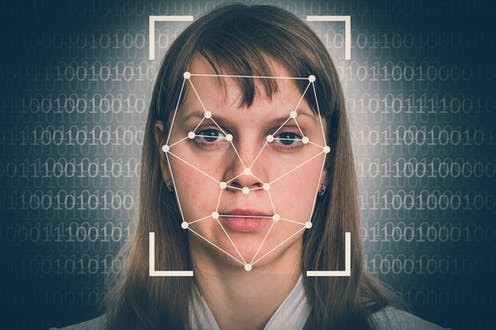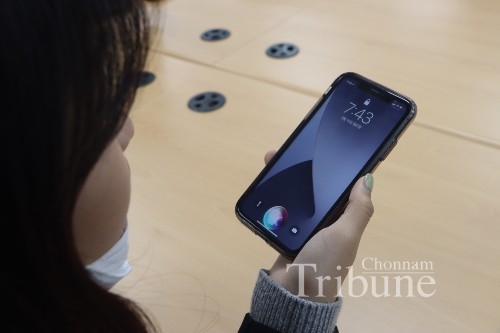Artificial intelligence (AI) is a branch of computer science and information technology that studies how computers can think, learn, and develop themselves with human intelligence. After Go AI "AlphaGo" was invented, AI began to be developed at a tremendous rate, and the age of AI has accelerated especially due to COVID-19. Currently, non-contact culture became commonplace and AI technology which is applied to our daily routine in many ways has penetrated deeply into human life. AI-driven applications also continue to evolve in many areas of our daily lives such as marketing, healthcare, and education, and it is expected to bring about more changes in the near future. The Chonnam Tribune will talk about its impacts on our everyday life and personal privacy, and highlight the importance of data literacy in the era of artificial intelligence.

AI-Powered Online Experience
Netflix may be the most familiar case of artificial intelligence being used in everyday life. Netflix is a U.S. content-on-demand service creation company that exceeded 100 million users worldwide in 2017, and its feature of personalization of movie recommendations played a major role in Netflix's growth. The platform's first screen shows movies relevant to the user’s taste because it uses a data and algorithm-based recommendation system, powered by AI and machine learning. Also the system combines collaborative and content-based filtering; the former analyzes movie selection information of existing users and recommends content that is liked by similar users in a way that automatically predicts users' interests based on taste information obtained from many users. The latter analyzes and classifies various films and compares them to a personal movie viewing pattern to calculate similarity. Through these AI-driven solutions, Netflix users can easily find videos that suit their personal tastes.
Recently, Naver, the first web portal in Korea, has developed an AI-based malicious comment blocking program to filter out excessive words and cleanbots that automatically block not only abusive language but also direct and indirect sexual expression. In addition, Instagram announced a new feature that allows users to delete multiple malicious comments at once to solve online bullying problems. The above mentioned examples show that AI has advantages that performs human-like tasks and its capabilities are powerful. By using several technologies such as machine and deep learning, it has the advantages of problem solving, learning and universal availability. Consequently, AI can process a huge amount of data, identify the patterns and rules of the data, learn, adjust to inputs and produce outputs, like the human brain.

AI Applications in Healthcare
Among various AI examples used in different areas, the most effective is in the medical field. Denmark's UV Disinfection (UVD) Robots are known to be playing a role in preventing the spread of the virus due to the outbreak of COVID-19, and more than 60 countries are currently using the UVD robot technology. It operates autonomously while exploring corridors and ways through pre-mapped layouts, and users can remotely control robots and run disinfection programs. Lee Hui-ju (Junior, Dept. of Nursing) said, “With the development of artificial intelligence, it is possible to replace human tasks, including dangerous tasks. It also seems that the development of AI has accelerated especially as the non-face-to-face era has opened due to the pandemic situation. I think the robot is a great advantage of AI technology because it can be disinfected more safely and quickly compared to humans. I hope this type of robot can be used in other fields as well.”
AI technology can also be helpful for people with visual impairments. According to the Ministry of Health and Welfare, the number of visually-handicapped people in Korea is 260,000 as of 2017 and 200 million worldwide. Many countries are already developing technologies using AI for disabled people. Representatively, the application ‘Aipoly,’ developed by an Australian startup, allows users to check surrounding objects in real-time through the cameras of their smartphones. It even describes images on paper or screen and recognizes colors and brands. Lee Ga-heon (Junior, Dept. of Materials Science and Engineering) said, “I think it is amazing and fortunate that artificial intelligence is useful for disabled people. I read several articles that they have various restrictions on movement because of the poor perception of their guide dogs. I hope that there will be no inconvenience in their lives thanks to AI technology.”

Invasion of Data Privacy
AI has been developed for a better society and a more convenient life. However, problems such as data bias, algorithm differentiation, misuse of technology, privacy infringement, and AI ethics are continuously emerging. Earlier this year, an ethical issue of artificial intelligence triggered by Scatter Lab’s AI chatbot "Lee Luda" expanded into social conflicts. It was created using deep learning technology last December but was suspended because it was embroiled in controversy over sexual minority hatred and personal information leakage. Moreover, it made people worry about the privacy infringement that could happen when it exposed certain individuals' addresses, account numbers, and even their real names without filtration. This is a rebuttal that AI-used tools have challenging impacts on our society as AI technology develops. Behind the convenience of using AI, there is uncertainty about technological outcomes. While well-used AI can be the most convenient tool for humans, it can be dangerous to us if misused.
AI speakers have been made aware of highly controversial privacy violations. Voice recognition services have collected voices of users to make AI speakers smarter by learning voices under various conditions such as gender and intonation. For instance, Apple has analyzed voice information through the AI secretary Siri, and keeps personal information linked to it for six months. Google stores the entire user's voice information indefinitely unless the user deletes it himself. Companies claim that there is no problem because they do not know who the owner of the voice is, and users have already agreed with the terms and conditions. Lee hui-ju said, “I did not know that Apple analyzes my voice information and keeps it, which includes personal conversations with family, lovers, and friends, which is an obvious violation of privacy. It is creepy to hear that what I said was recorded.”

Deepfake Videos Threaten Privacy
Deepfake, which is a combination of word ‘deep learning’ and ‘fake’, is another representative example of the ambivalence of AI. It is used for a video and voice composition by attaching the face of a particular character to another person's body. While the use of deepfake in the video industry is endless, we should be careful because of its high ripple effect and possibility of abuse. Some people used it to slander certain politicians or to incite the public with images of them, which can be politically abused. Deepfake pornography has been made by stealing others’ faces without permission. According to a report by DeepTrace, a Dutch cybersecurity research company, porno accounts for 96 percent of the world's deepfake videos, and 25 percent of the faces in the porno were found to be Korean female celebrities.
Lee Ga-heon said, “I have seen deepfake videos on SNS, and I think it is proof that technology can be misused. If a person manipulates and uploads fake content using a celebrity’s picture without permission, the celebrity will have their privacy and human rights infringed.” However, the bigger problem is that it can spread to the public, and the target could be anyone. By making it easier to get an image, certain people’s images, can be easily collected. Lee hui-ju mentioned, “It is an obvious mistake and a crime to synthesize a face photo without the person’s consent. Since the secondary work was made and used in the video at will by stealing pictures without permission, it will certainly damage the subject.”

Keep Data Literacy in Mind
As AI continues to develop, it has become an indispensable part of our lives and plays a role in helping us make better decisions. Especially its natural language processing allows us to understand context, the similarities and differences in meaning and the relationships between words of natural languages. Languages that people use on a daily basis cannot be understood immediately by computers, so it uses a transformation technique called ‘word embedding’ to change words. Because the results vary depending on data used for learning, however, different types of biases can appear, including gender, region, academic background, and skin color.
Lee Sung-yeop, a director of Center for Technology Law and Policy stated, “At a time when risks from AI are realized, it is necessary to introduce legal regulations on issues that must be followed in the process of AI development. This is because strong AI, which can be autonomous beyond human control, can be a disaster for mankind. The "Lee Luda" incident reminded users of the importance of AI literacy education.” In the AI-driven world, technology that collects, handles and manages personal data can lead to privacy infringement. We need to know where and how information we produce is used, by learning data literacy which is an ability to read data and find the hidden meaning.
By Ma Joon-hee, Student Editor

